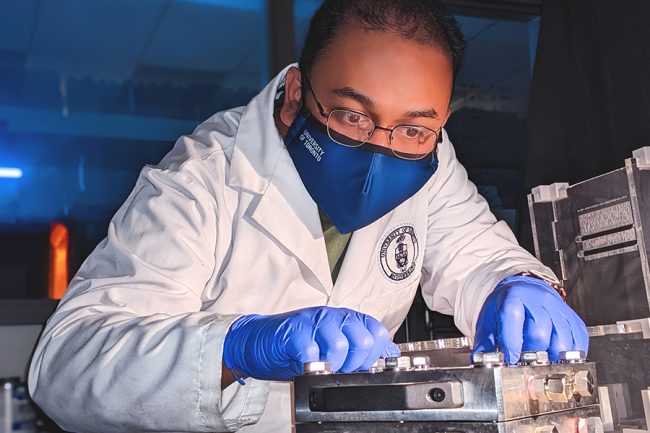
For PhD candidate Nitish Sarker (MIE), the drive to build a more sustainable world through the practice of global engineering comes from a very personal place.
“Growing up in a lower middle-income country like Bangladesh, I have seen first-hand how critical certain technologies can be in the water and energy sectors,” he says. “That is the underlying motivation behind all of my work.”
Sarker recently earned the Global Engineering Outstanding Student Award from the Mortenson Center in Global Engineering at the University of Colorado Boulder. The award seeks to highlight the work of individuals who contribute to the field of global engineering.
“The level of growth in the global engineering community has been really strong in the past decade,” says Ahmed Mahmoud, Program Manager at U of T Engineering’s Centre for Global Engineering (CGEN).
“CGEN has been at the forefront of supporting and inspiring students in this area. To see one of our students receive this award is a tremendous validation of our efforts and a stellar endorsement of U of T’s commitment to sustainable global development.”
In the Water and Energy Research Lab of Professor Amy Bilton (MIE), Sarker’s thesis project focuses on leveraging solar power to provide drinking water to remote, rural or low-income communities.
“These communities often lack access to electrical grids or centralized water infrastructure and treatment plants, so they are hard to service,” says Sarker. “There are already some stand-alone treatment plants out there, but we need to reduce the costs associated not only with building them, but also maintaining them.”
Sarker gives the example of reverse osmosis (RO), which uses electricity to pump water through membrane filters to remove dissolved minerals, as well as bacteria and other pathogens. In parts of Bangladesh, private companies and NGOs operate small-scale RO plants and sell the filtered water to customers in kiosks similar to ATMs.
“That solution works, but grid electricity is expensive and often unreliable or unavailable, which impacts the cost of the water produced,” says Sarker. “Solar power eliminates the need for a grid, and is also affordable. The cost of solar panels is getting lower every day, and once you install them, you are essentially getting energy for free from the sun.”
But solar power may introduce a new problem: when the sun goes down, the pumps stop working. RO filters are designed to operate with constant pressure across the membrane, so turning the pumps on and off can reduce their operating life. In particular, it can exacerbate the problem of scaling, in which dissolved minerals in the water deposit on the surface of the filter, reducing its effectiveness.
In their lab, Sarker and Bilton developed a framework for evaluating RO scaling in real-time and at different length scales. The system allowed them to explore different ways to prevent scaling while still operating the pump intermittently, as would be required for a solar-powered installation. The solution they hit on was surprisingly simple: an optimized rinse cycle.
“We optimized an end-of-the-day rinsing process that could be used in a battery-less, solar-powered RO system using the water produced on any given day,” says Sarker. “While doing so, we lose about two percent of the water we filtered, but we’ve shown that it makes a big difference to the filter maintenance. It also improves the efficiency such that over the course of a week, we actually produce more clean water than if we didn’t use the rinsing cycle.”
Though it may seem like a minor improvement, extending the life of the filter and the associated reduction in maintenance can make a big difference in regions where both replacement parts and technical expertise are hard to find.
“Nitish’s project is an excellent example of how engineering research can address some critical barriers towards adoption of clean water technologies in remote communities,” says Bilton. “We’re planning towards field evaluation in the near future.”
Sarker is optimistic about the potential global impact of the innovation.
“Our solution doesn’t require any expensive chemicals or a separate infrastructure, and thus is readily applicable to water-stressed locations worldwide,” says Sarker. “Around the world, there are more than 800 million people who don’t have any water treatment at all. This kind of solution could really help them.”
– This story was originally published on the University of Toronto’s Faculty of Applied Science and Engineering News Site on March 22, 2022 by Tyler Irving